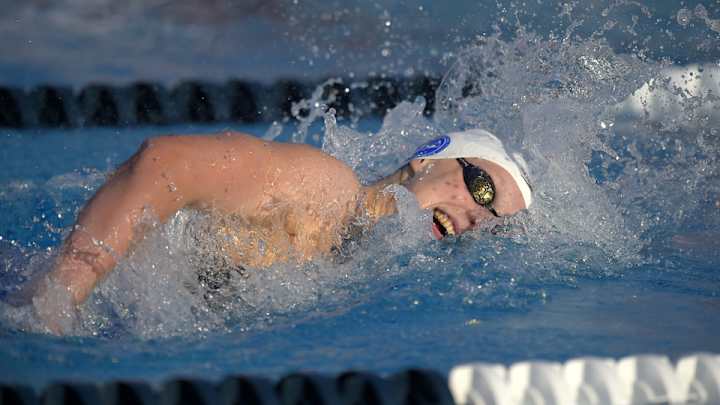Ledecky sets record at U.S. National Championships, Phelps struggles

Somewhere on the roster of the world’s greatest female athletes, Katie Ledecky’s name belongs on the list or at least the discussion. Ledecky, the 17-year-old from Bethesda, Md., continued to etch her stamp on swimming history Saturday, lowering the world record in the 400-meter freestyle to 3:58.86 at the U.S. National Championships. In so doing, she bested the mark of 3:59.15 set by Italy’s Federica Pellegrini at the 2009 World Championships in Rome, where records enhanced by fast suits fell left and right. In an era when Ledecky has no such material enhancements, the high schooler is assaulting history. In June, she broke world records in the 800 and 1,500-meter freestyle races at the Woodlands Swim Team Senior Invitational meet in June. It is now the first time since Janet Evans owned the longer races that a woman has held all three distance freestyle records between 400 and 1,500 meters.
“It’s hard not to have [the record] in my mind,” Ledecky said after the race. “But it wasn’t in the forefront. I just want to have a good swim.”
That’s about the most detail you’re likely to get from Ledecky, who is perfectly pleasant by nature, but not especially gregarious. She stepped out of her shell a bit by tossing off her cap in celebration after the victory and answering a question about what she could possibly hope to accomplish next.
“I haven’t thrown up after a race yet,” she joked. “Maybe that’s what I have to shoot for.”
With three individual world titles and three world records already on her resume, Ledecky almost risks being bored by the two-year wait until the two-year wait to the next Olympics.
She nearly broke the 400-free mark in the morning preliminaries when she touched the wall in 3:59.89, four seconds faster than anyone has swum the race in a final this season. In the evening, she was ahead of record pace from the first wall. From the moment the public-address announcer shouted the 100-meter split, 57.7 seconds, which was ahead of record pace, the crowd stood and was up and down through the remaining splits, and her coach, Bruce Gemmell, was pumping his fists at the side of the pool deck. Under Gemmell’s guidance, Ledecky has built a penchant for being able to split her race effectively rather than burning herself out in the early parts of races.
“Bruce should be happy,” Ledecky said. “He told me to make sure I didn’t push the first hundred too much. Just keep it steady, that’s the idea.”
Even as she appeared to lose ground on the record through splits six and seven, she saved plenty for the final lap.
“I thought there was something left,” she said modestly. “You know, that was the plan.”
In recent years, the 400-free has been a race in which few records have fallen. Australian Tracy Wickham set the mark of 4:06.28 in 1978. Over the next 28 years, it was lowered only twice by Evans, first in 1987 at the U.S. Open to 4:05.45, and then the next year at the Olympics in Seoul, Korea, to 4:03.85.
“I mean to think of what Janet accomplished in her career makes a record like that even more special,” Ledecky said. “There were many like her… It’s an honor to be mentioned in the same sentence as Janet.”
Now the same is being said about Ledecky. And this is the scary part for the rest of the world. Everything about her swimming, from her strength to her speed to her knowledge of the events, is likely to improve.
“I don’t think Katie has really reached what she can do yet,” says Gemmell. The coach likes to refer to the pupil as his “assassin,” or “metronome,” an otherworldly bolt of brilliance. But the way Gemmell sees it, Ledecky’s ability to swim different races in different ways -- holding onto early leads or coming on at the end -- have made it easier for her to keep the steady pace he preaches. “Up until a couple of years ago, she was only comfortable with, and only swum races real hard going out from the start. She can now swim back half, front half, middle half, every other lap, however we choose to swim it.”
Michael Phelps struggled into sixth place in the 100-meter backstroke race that was won by Matt Grevers, the reigning Olympic champion, in 52.75. Phelps touched in 53.95. He has never made a world or Olympic team in a backstroke race, and it generally considered his third-best stroke, behind the freestyle and butterfly and ahead of just the breaststroke. He swims the stroke as part of the individual medley races, but has taken it on as an individual race sporadically during his career. While Phelps’ fitness level has been up and down since he started his comeback earlier this year, but here in Irvine, his form has been off noticeably in several races. During the backstroke final, he cost himself time twice by scraping the lane line with his right arm and then working himself back near the middle of the lane.
“Lots of work ahead,” Phelps said afterwards. He already secured his place on the Pac Pacific team Friday by finishing second in the 100-meter butterfly. He is entered in the 200 individual medley on Sunday, the final day of the meet.

Brian Cazeneuve has covered Olympic sports extensively for many years with SI and SI.com.